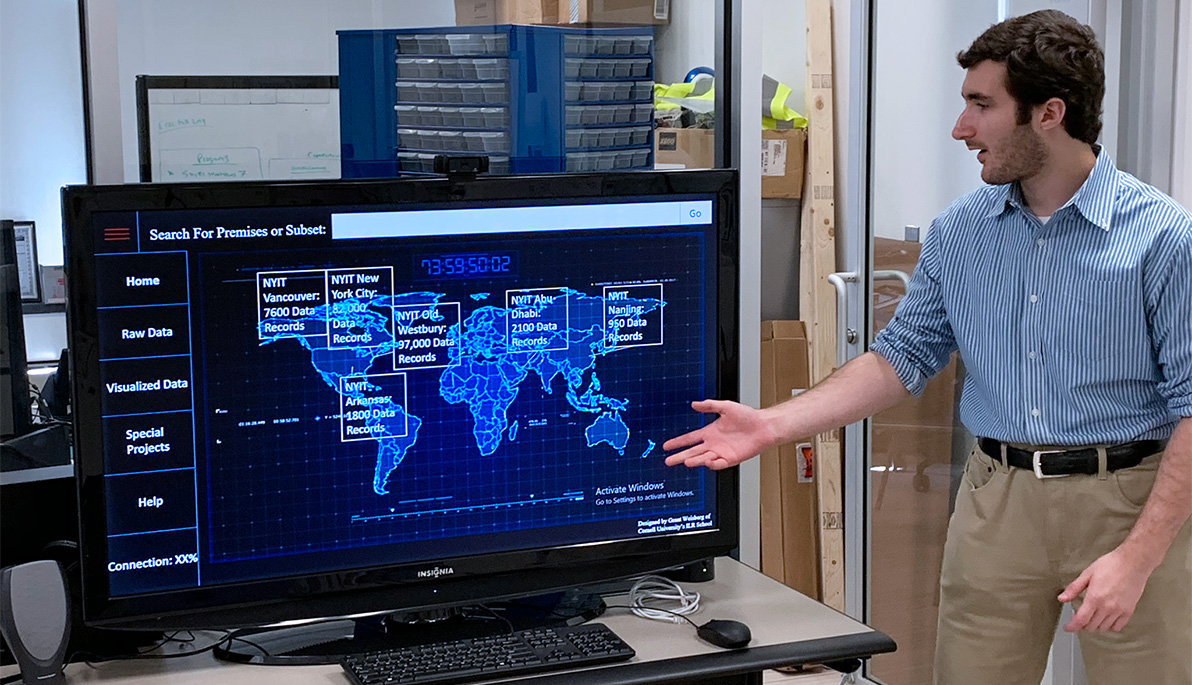News
E.R.R.S.E.L.A. Offers a New Take on Tech
May 11, 2020
A year ago, Michael Nizich, Ph.D., director of New York Tech’s Entrepreneurship and Technology Innovation Center (ETIC), created E.R.R.S.E.L.A., the ETIC Research Robot for Student Engagement and Learning Activities.
His vision: a collaborative research and engagement program to attract students, particularly those in the College of Engineering and Computing Sciences, at all campuses across all disciplines and skill levels, and allow them to participate without them having to be physically present at the ETIC on the Old Westbury campus.
During this academic year, approximately 30 New York Tech students have worked on E.R.R.S.E.L.A., contributing to the robot’s design and functionality. Then came the COVID-19 pandemic, moving all education online. But no worries here! Since it was designed for remote capability, E.R.R.S.E.L.A. has allowed students to continue their “hands-on” research at a time when distance learning has become the norm.
The robot’s application programming interface (API) allows students, faculty, or teams to add capabilities or software intelligence working from their own laptop or a classroom computer.
Prior to COVID-19, E.R.R.S.E.L.A. functioned as a community outreach project, accessed by local students from high schools on Long Island, including Syosset, Commack, and Glen Cove, as well as students at regional colleges like Wesleyan and Cornell. Since the implementation of social distancing directives, Nizich reports an uptick in requests from high school teachers wanting E.R.R.S.E.L.A sessions for their online classrooms, as well as proposals for E.R.R.S.E.L.A projects from New York Tech students.
“Students participate under the advisement of staff and faculty leaders at the ETIC and receive guidance and training as they create and implement their E.R.R.S.E.L.A. technology,” says Nizich.
In April, Nizich launched the iNTEREST program, a series of twice-weekly seminars conducted via Zoom to help train new and current E.R.R.S.E.L.A. participants in skills related to the project, from developing software and web applications to creating and managing databases.
“iNTEREST is essentially the former ETIC Technology Skills Workshops moved online due to COVID-19,” says Nizich. “We’ve branded iNTEREST as a remote program, which will continue even after we return to campus.”
E.R.R.S.E.L.A. was also the star of the first STEAM Outreach Happy Hour, an initiative launched in the last week in April to increase collaboration among New York Tech faculty, staff, and students working on projects that engage local communities. More than a dozen students and faculty participated in the inaugural session via Zoom, enjoying an overview from Nizich followed by a robust exchange of ideas for furthering and expanding the program.
In a relatively short time, E.R.R.S.E.L.A. has demonstrated how technology and innovation can promote engagement despite our social isolation.
“These uncertain times have provided us with the unique opportunity to transcend our traditional areas of expertise and coalesce around larger community-based initiatives,” says Babak Beheshti, Ph.D., dean of NYIT College of Engineering and Computing Sciences. “This inherently multidisciplinary initiative around our robotics platform is precisely one that addresses this opportunity.”
By Renée G. Levy




